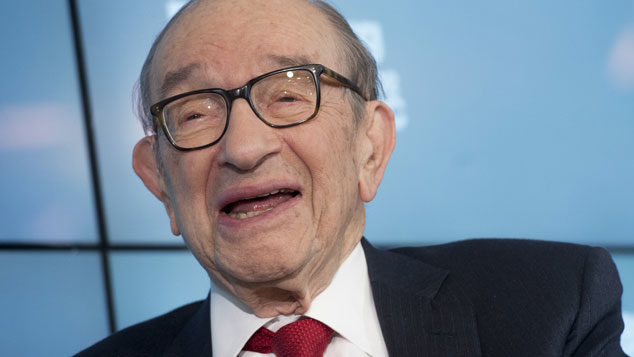
Alan Greenspan – former US Federal Reserve chairman and foremost trickster deity in the financial pantheon – was up to mischief again the other day.
“We are experiencing a bubble, not in stock prices but in bond prices”, he told Bloomberg.
Bond managers around the world harrumphed sensibly and muttered that Greenspan, with all due respect, didn’t know what he was talking about. And in any case, wasn’t Greenspan the very man who once told everyone that you couldn’t spot a bubble until after it had burst?
The same bond fund managers then rushed out this morning and stuffed their portfolios with $1bn-worth of government debt issued by no less an entity than the Iraqi government.
Maybe – just maybe – Greenspan’s got a point…
Iraq: not the only gobsmacker of a bond out there
Iraq has issued $1bn-worth of five-year debt. The deal was seven times oversubscribed. In other words, investors were queueing around the block to buy this stuff. So much so that the country was able to knock the yield down by 0.25% to 6.75%.
Iraq did issue bonds earlier this year. But those were guaranteed by the US, so they really aren’t comparable. This is the country’s first independent bond issue in at least a decade.
Now, you can certainly make a case for investing in Iraqi bonds. Like most other significant issues to do with Iraq, it’s largely based on oil.
And it’s not as though Iraq is the only gobsmacker of a bond issue seen this year. Argentina famously sold 100-year bonds for an ever-so-slightly higher yield than these Iraqi bonds. Meanwhile, Greece just got back into the market as well.
But while Argentina and Greece are both on the unreliable side, neither is actually at war.
So while you can make the argument for buying Iraqi debt, and you can even understand why investors are piling in – in relative terms, the yield is not hugely out of line with similarly risky bonds – none of that makes this a good idea.
As Bloomberg columnist Marcus Ashworth puts it: “This would seem to define the very idea of a credit bubble: a wholly insufficient reward for what must be seen as a considerable risk, as Iraq is still in the midst of a serious civil conflict in the most unstable region in the world.”
As Ashworth puts it: “Return of capital seems to have taken a back seat to a decent coupon.”
“So what?” you might be thinking. You didn’t wake up this morning planning to buy an Iraqi government bond, and despite that mouthwatering 6.75% yield, you haven’t changed your mind so far. So why am I even bothering to draw it to your attention?
Good question. And no, it’s not just an excuse to point and laugh at yet more institutional silliness.
The point is this: if investors are so desperate for income that they are willing to overlook the potential risks involved here in exchange for a paltry 6.75%, then what other risks are they overlooking? What else are they overpaying for?
And what might you be overpaying for as a result?
It’s time to invest defensively
One of the main factors at work in bubbles is that investors start to feel that they have no alternative but to take part. “If I don’t buy an Iraqi bond yielding 6.75%, where am I going to put my money? A US Treasury yielding 1.8%? Don’t make me laugh. How will I hit my return targets that way?”
In a fearful market, investors assume that anything that can go wrong, will go wrong. So they ignore great opportunities because they don’t want to take any risk at all.
In a greedy – or rather desperate – market, investors cross their fingers and close their eyes and bet that everything will go right. So they snap up terrible investments because they feel that they can’t afford to miss out.
That’s certainly happening in parts of the market right now. You can rationalise the bond market as much as you want: interest rates might stay low forever, there’s not much inflation around, central banks won’t let anyone go bust, we’re in a period of secular stagnation – but you certainly can’t say that it’s cheap.
What can you do? I’d suggest investing defensively. That doesn’t mean selling everything and moving into cash (although it’s probably worth holding more cash than you normally would).
But if you are investing in individual stocks or funds, then focus on the downside – no one else is, so you should. And focus particularly on liquidity and complexity. That’s the stuff that blows up first, and it’s also the stuff that goes to zero.
A FTSE 100 tracker could leave you nursing a 50%-plus loss from here in a year’s time if things went properly pear-shaped. That’s what equities are like. But a) you know you’d be able to sell it pretty much instantly at any point you wanted; and b) you know that if it got that bad, it’d probably be time to buy back in rather than sell out. You have a rough idea of what to expect.
Other things – cryptocurrencies, many areas of alternative finance, obscure bond funds – are untested. If markets suffer a bad patch, will the shutters come down? You only have to look at what happened to open-ended commercial property funds in the wake of Brexit to see how things can turn very quickly indeed and leave you unable to access your money.
So look at what you own. How quickly are you likely to be able to get at your money if it all goes rotten? And do you understand what you’re investing in? How does it make its money? If you struggle to explain it clearly to a friend, then you need to do more research. And if you still can’t explain it, you need to think about why it’s in your portfolio at all.